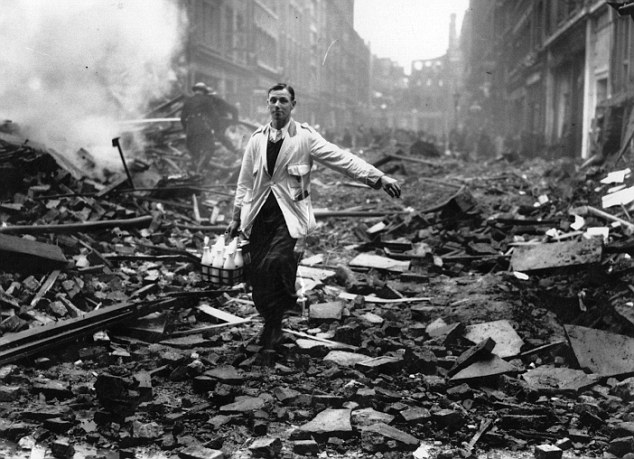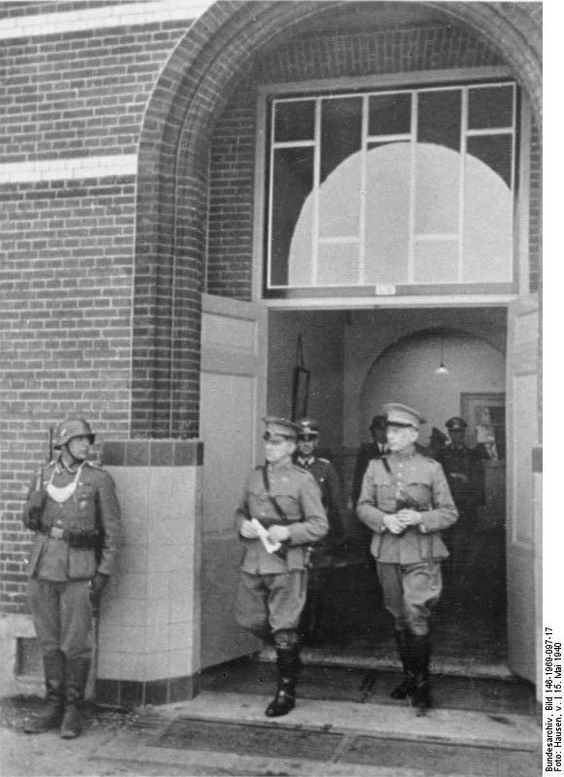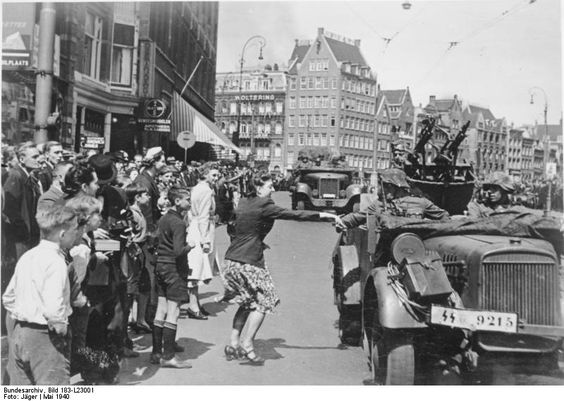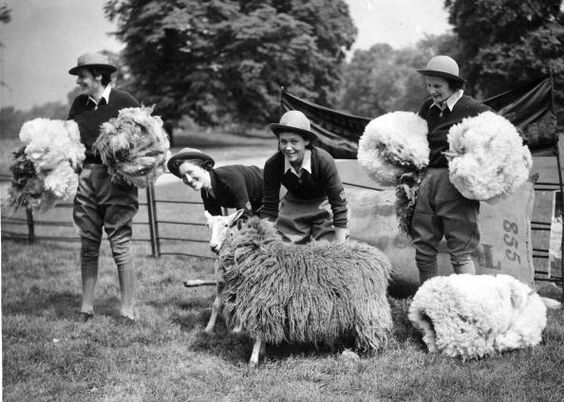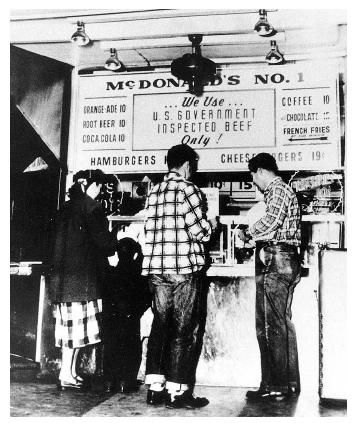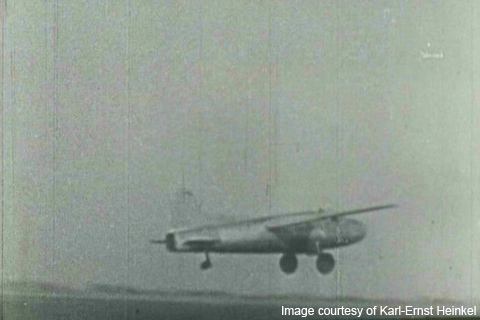Battle of Britain: Weather is poor on 9 October 1940, preventing major operations. As on the 8th, there are mostly small raids that don't accomplish much, with one major raid in the afternoon. There is a lot of damage, but by this time, bad as it is, the bombing is becoming almost routine.
Early in the morning, a bomber scores a strike on St. Paul's Cathedral. It damages the High Altar. Later in the morning, around 11:00, a moderate-sized raid of 20-30 planes reaches south London. The fighter-bombers (Jabos) fly high, as usual, and elude interception. Another raid of around 35 aircraft around the same time targets Gravesend, Hornchurch, and Canewdon. Other raids of about the same size hit Maidstone and Dover.
After lunch, at 13:00, some Heinkel He 111s attack a convoy of Land's End, but RAF No. 601 Squadron intercepts and shoots two of the bombers down. At 14:30, the day's main raid of about 175 aircraft crosses to hit East London. This formation includes Junkers Ju 88s and causes appreciable damage. Major dogfights break out over the Thames Estuary and points east. Damage is scattered, with many private residences taking damage.
Right before sunset, at 18:53, a Jabo attack on Solent Naval Air Station causes little damage. About half an hour later, the Luftwaffe attacks Yeovilton Naval Air Station, but the damage is slight. A little later, attacks are made on St Merryn Naval Air Station, which damages a Swordfish and a Proctor aircraft.
After dark, London is the main bomber target. The attacks begin around 19:00 and are of moderate intensity. Aside from London, the usual targets of Liverpool, Manchester, and Derby are hit. The Luftwaffe drops 386 tons of High Explosive bombs on London and 70,000 one kg bombs. The Luftwaffe also drops mines all along the English Channel shoreline.
Losses for the day are light, with the RAF losing only three planes and the Luftwaffe 9.
Oblt. Hans-Ekkehard Bob from 7./JG 54 makes two claims, both Spitfires.
European Air Operations: RAF Bomber Command attacks oil installations at Hamburg and various targets in Holland (Texel Airfield, Helder) and France (Le Havre) during the day. After dark, it launches an oil installation at Cologne, a Krupp factory in Essen, and various Channel ports.
A Whitley of RAF No. 77 Squadron returning from a raid over Germany during the night flies into high ground west of Snape while returning. Midshipman D. A. C. Hadingham perishes.
RAF Coastal Command chips in with an attack on the port of Brest, causing minor damage to destroyers Eckholdt, Lody, and Riedel. The RAF loses one Albacore biplane, the crew becoming POWs.
Battle of the Atlantic: U-103 (KrvKpt. Viktor Schütze), on her first patrol and having entered the Atlantic between the Faroe and the Shetland Islands, has a big day. During the morning, the lookout spots Convoy SC 6 about 37 miles north-northwest of Rockall and Schütze goes to work. After stalking the convoy all day, he shoots three torpedoes at 22:11 and makes three hits.
U-103 torpedoes and sinks 3816 ton Greek freighter Delphin. Everybody survives.
U-103 torpedoes and sinks 4407 ton Greek freighter Zannes Gounaris, which is carrying a cargo of phosphate rock. One crewman perishes.
U-103 also torpedoes and badly damages 3697-ton British freighter Graigwen (Master Daniel Wright Fowle). After putting a torpedo into it at 22:11, the crew abandoned the ship. U-123 (Kptlt. Karl-Heinz Moehle) sees the drifting hulk on 10 October at 21:33 and finishes it off with a torpedo. There are 27 survivors and 7 crew perish. The survivors are picked up by HMS Enchantress.
After this engagement, the convoy escorts depth-charge U-103, but it escapes.
Royal Navy 321 ton minesweeper (former fishing trawler) HMT Sea King (Acting Temporary Skipper T. Sleeth RNR) hits a mine and sinks in the Humber Estuary about 28 nautical miles off Bull Sand Fort, Grimsby. All 14 crew perish.
The Luftwaffe bombs and sinks 633-ton British collier Alderney Queen off Grassholm Island in the Bristol Channel. Everybody aboard survives.
The weather in the North Sea is poor, and Royal Navy aircraft carrier HMS Furious is forced to abandon a planned strike on Bodo after leaving Scapa Flow.
Convoy OB 226 departs Liverpool, Convoy FN 304 departs from Southend, Convoy HG 45 (49 ships and carrying 1093 civilians on troopship Neuralgia) departs from Gibraltar.
German raider (AMC) Kormoran is commissioned.
Battle of the Mediterranean: The Free French under General Charles de Gaulle invade and capture Duala in Cameroon. This establishes Free French control over the colony, from which de Gaulle hopes to launch air raids against Italian positions to the north and east. De Gaulle himself arrives aboard Free French minesweeper Commandant Duboc.
Both the Royal Navy fleet based at Alexandria and elements of the Italian fleet based at Taranto are at sea, but they don't spot each other. Aerial reconnaissance from Malta, though, spots Italian ships at sea near Taranto. The reconnaissance establishes that the Italians have five battleships there.
Royal Navy submarine HMS Regent torpedoes the 6968-ton Italian transport Antonietta Costa off Durrës, Albania. The freighter manages to make it close enough to shore - about 10 miles - to run aground, but it is a total loss.
The RAF attacks Tobruk Harbor. There is some skirmishing south of Buna in East Africa that results in some Italian casualties.
Italian destroyers Vivaldi, Da Noli, and Tarigo lay mines south of Malta.
At Malta, Governor Dobbie requests permission to implement a bonus system for the fast construction of shelters.
German/Romanian Relations: German troops continue entering Romania with that government's permission in order to secure the Ploesti oil fields and other key points. The oil fields are a major preoccupation of Adolf Hitler and are the real reason for this "invasion," which ostensibly is to train the Romanian Army (which doesn't really need any training). While the Soviet Union looms nearby, Hitler is more worried at this point by British sabotage.
Anglo/Canadian Relations: Continuing the cozy relationship between Great Britain and North America, the British purchasing mission places initial orders for 20 10,000 ton freighters. This order eventually expands to 26 ships.
British Government: In a quirk of British politics, Prime Minister Winston Churchill has not been the leader of the Conservative Party - that honor has belonged to Neville Chamberlain. Today, with the "retirement" of Chamberlain recently due to illness, that is rectified and Churchill formally becomes the leader of the party. While not well-liked within the party, for better or worse he has become the face of the Conservatives and of the war effort in general.
Holland: The Germans ban Jews and half-Jews from public employment.
Future History: John Winston Lennon is born at Liverpool Maternity Hospital to Julia and Alfred Lennon. Alfred is a merchant seaman and is not present. John Lennon becomes a happy-go-lucky schoolboy in the 1950s, gets a guitar from his mother in 1956 and goes to art school. He forms a skiffle/rock and roll group called the Quarrymen in 1956 and meets younger student Paul McCartney on 6 July 1957. They team up with McCartney's even younger friend George Harrison and Lennon's old pal Stuart Sutcliffe from art school (from which Lennon flunks out). In early 1960, they rename the group "The Beatles," and in August/September perform in Hamburg. They continue these German gigs into 1962, when Brian Epstein, the son of a local record store owner, becomes their manager and starts them on a path to recording their music. Ringo Starr, a local but well-known Liverpool drummer, now joins the group to replace the first drummer, Pete Best. Sutcliffe passes away around this time, leaving the lineup of Lennon, McCartney, Harrison, and Starr.
The Beatles release their first single, "Love Me Do," in October 1962, and finds middling success (on its initial release). After recording their first album, Please Please Me, in February 1963, which contains 8 songs written by Lennon and McCartney, the group begins to get mainstream success. The movie "A Hard Day's Night" in 1964 causes the group to explode in popularity, and an appearance in New York on "The Ed Sullivan Show" in February 1964 cements their international fame. The group, always led by Lennon and McCartney, goes on to become the most successful act in pop music history, with songs reaching the charts decades after the Beatles' breakup in early 1970. John Lennon goes on to solo success as a singer and songwriter but is assassinated by a crazed fan on 8 December 1980.
October 1940
October 1, 1940: Wait Daddy October 2, 1940: Hitler's Polish Plans
October 3, 1940: British Cabinet Shakeup
October 4, 1940: Brenner Pass Meeting
October 5, 1940: Mussolini Alters Strategy
October 6, 1940: Iron Guard Marches
October 7, 1940: McCollum Memo
October 8, 1940: Germans in Romania
October 9, 1940: John Lennon Arrives
October 10, 1940: Führer-Sofortprogramm
October 11, 1940: E-Boats Attack!
October 12, 1940: Sealion Cancelled
October 13, 1940: New World Order
October 14, 1940: Balham Tragedy
October 15, 1940: Mussolini Targets Greece
October 16, 1940: Japanese Seek Oil
October 17, 1940: RAF Shakeup
October 18, 1940: Convoy SC-7 Catastrophe
October 19, 1940: Convoy HX-79 Catastrophe
October 20, 1940: Convoy OB-229 Disaster
October 21, 1940: This Evil Man Hitler
October 22, 1940: Aktion Wagner-Burckel
October 23, 1940: Hitler at Hendaye
October 24, 1940: Hitler and Petain
October 25, 1940: Petain Woos Churchill
October 26, 1940: Empress of Britain Attack
October 27, 1940: Greece Rejects Italian Demands
October 28, 1940: Oxi Day
October 29, 1940: US Draft Begins
October 30, 1940: RAF Area Bombing Authorized
October 31, 1940: End of Battle of Britain
2020
Early in the morning, a bomber scores a strike on St. Paul's Cathedral. It damages the High Altar. Later in the morning, around 11:00, a moderate-sized raid of 20-30 planes reaches south London. The fighter-bombers (Jabos) fly high, as usual, and elude interception. Another raid of around 35 aircraft around the same time targets Gravesend, Hornchurch, and Canewdon. Other raids of about the same size hit Maidstone and Dover.
After lunch, at 13:00, some Heinkel He 111s attack a convoy of Land's End, but RAF No. 601 Squadron intercepts and shoots two of the bombers down. At 14:30, the day's main raid of about 175 aircraft crosses to hit East London. This formation includes Junkers Ju 88s and causes appreciable damage. Major dogfights break out over the Thames Estuary and points east. Damage is scattered, with many private residences taking damage.
Right before sunset, at 18:53, a Jabo attack on Solent Naval Air Station causes little damage. About half an hour later, the Luftwaffe attacks Yeovilton Naval Air Station, but the damage is slight. A little later, attacks are made on St Merryn Naval Air Station, which damages a Swordfish and a Proctor aircraft.
After dark, London is the main bomber target. The attacks begin around 19:00 and are of moderate intensity. Aside from London, the usual targets of Liverpool, Manchester, and Derby are hit. The Luftwaffe drops 386 tons of High Explosive bombs on London and 70,000 one kg bombs. The Luftwaffe also drops mines all along the English Channel shoreline.
Losses for the day are light, with the RAF losing only three planes and the Luftwaffe 9.
Oblt. Hans-Ekkehard Bob from 7./JG 54 makes two claims, both Spitfires.
 |
| Hawker Hurricanes, RAF No. 85 Squadron, October 1940. |
A Whitley of RAF No. 77 Squadron returning from a raid over Germany during the night flies into high ground west of Snape while returning. Midshipman D. A. C. Hadingham perishes.
RAF Coastal Command chips in with an attack on the port of Brest, causing minor damage to destroyers Eckholdt, Lody, and Riedel. The RAF loses one Albacore biplane, the crew becoming POWs.
Battle of the Atlantic: U-103 (KrvKpt. Viktor Schütze), on her first patrol and having entered the Atlantic between the Faroe and the Shetland Islands, has a big day. During the morning, the lookout spots Convoy SC 6 about 37 miles north-northwest of Rockall and Schütze goes to work. After stalking the convoy all day, he shoots three torpedoes at 22:11 and makes three hits.
U-103 torpedoes and sinks 3816 ton Greek freighter Delphin. Everybody survives.
U-103 torpedoes and sinks 4407 ton Greek freighter Zannes Gounaris, which is carrying a cargo of phosphate rock. One crewman perishes.
U-103 also torpedoes and badly damages 3697-ton British freighter Graigwen (Master Daniel Wright Fowle). After putting a torpedo into it at 22:11, the crew abandoned the ship. U-123 (Kptlt. Karl-Heinz Moehle) sees the drifting hulk on 10 October at 21:33 and finishes it off with a torpedo. There are 27 survivors and 7 crew perish. The survivors are picked up by HMS Enchantress.
After this engagement, the convoy escorts depth-charge U-103, but it escapes.
Royal Navy 321 ton minesweeper (former fishing trawler) HMT Sea King (Acting Temporary Skipper T. Sleeth RNR) hits a mine and sinks in the Humber Estuary about 28 nautical miles off Bull Sand Fort, Grimsby. All 14 crew perish.
The Luftwaffe bombs and sinks 633-ton British collier Alderney Queen off Grassholm Island in the Bristol Channel. Everybody aboard survives.
The weather in the North Sea is poor, and Royal Navy aircraft carrier HMS Furious is forced to abandon a planned strike on Bodo after leaving Scapa Flow.
Convoy OB 226 departs Liverpool, Convoy FN 304 departs from Southend, Convoy HG 45 (49 ships and carrying 1093 civilians on troopship Neuralgia) departs from Gibraltar.
German raider (AMC) Kormoran is commissioned.
 |
| Hermann Goering on an inspection tour in France, September/October 1940 (Dreesen, Federal Archives). |
Both the Royal Navy fleet based at Alexandria and elements of the Italian fleet based at Taranto are at sea, but they don't spot each other. Aerial reconnaissance from Malta, though, spots Italian ships at sea near Taranto. The reconnaissance establishes that the Italians have five battleships there.
Royal Navy submarine HMS Regent torpedoes the 6968-ton Italian transport Antonietta Costa off Durrës, Albania. The freighter manages to make it close enough to shore - about 10 miles - to run aground, but it is a total loss.
The RAF attacks Tobruk Harbor. There is some skirmishing south of Buna in East Africa that results in some Italian casualties.
Italian destroyers Vivaldi, Da Noli, and Tarigo lay mines south of Malta.
At Malta, Governor Dobbie requests permission to implement a bonus system for the fast construction of shelters.
German/Romanian Relations: German troops continue entering Romania with that government's permission in order to secure the Ploesti oil fields and other key points. The oil fields are a major preoccupation of Adolf Hitler and are the real reason for this "invasion," which ostensibly is to train the Romanian Army (which doesn't really need any training). While the Soviet Union looms nearby, Hitler is more worried at this point by British sabotage.
 |
| The New York Times reports the end of the World Series. |
British Government: In a quirk of British politics, Prime Minister Winston Churchill has not been the leader of the Conservative Party - that honor has belonged to Neville Chamberlain. Today, with the "retirement" of Chamberlain recently due to illness, that is rectified and Churchill formally becomes the leader of the party. While not well-liked within the party, for better or worse he has become the face of the Conservatives and of the war effort in general.
Holland: The Germans ban Jews and half-Jews from public employment.
Future History: John Winston Lennon is born at Liverpool Maternity Hospital to Julia and Alfred Lennon. Alfred is a merchant seaman and is not present. John Lennon becomes a happy-go-lucky schoolboy in the 1950s, gets a guitar from his mother in 1956 and goes to art school. He forms a skiffle/rock and roll group called the Quarrymen in 1956 and meets younger student Paul McCartney on 6 July 1957. They team up with McCartney's even younger friend George Harrison and Lennon's old pal Stuart Sutcliffe from art school (from which Lennon flunks out). In early 1960, they rename the group "The Beatles," and in August/September perform in Hamburg. They continue these German gigs into 1962, when Brian Epstein, the son of a local record store owner, becomes their manager and starts them on a path to recording their music. Ringo Starr, a local but well-known Liverpool drummer, now joins the group to replace the first drummer, Pete Best. Sutcliffe passes away around this time, leaving the lineup of Lennon, McCartney, Harrison, and Starr.
The Beatles release their first single, "Love Me Do," in October 1962, and finds middling success (on its initial release). After recording their first album, Please Please Me, in February 1963, which contains 8 songs written by Lennon and McCartney, the group begins to get mainstream success. The movie "A Hard Day's Night" in 1964 causes the group to explode in popularity, and an appearance in New York on "The Ed Sullivan Show" in February 1964 cements their international fame. The group, always led by Lennon and McCartney, goes on to become the most successful act in pop music history, with songs reaching the charts decades after the Beatles' breakup in early 1970. John Lennon goes on to solo success as a singer and songwriter but is assassinated by a crazed fan on 8 December 1980.
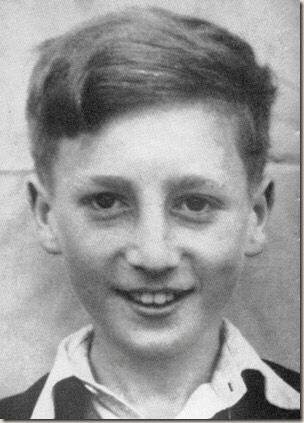 |
| John Winston Lennon. |
October 1, 1940: Wait Daddy October 2, 1940: Hitler's Polish Plans
October 3, 1940: British Cabinet Shakeup
October 4, 1940: Brenner Pass Meeting
October 5, 1940: Mussolini Alters Strategy
October 6, 1940: Iron Guard Marches
October 7, 1940: McCollum Memo
October 8, 1940: Germans in Romania
October 9, 1940: John Lennon Arrives
October 10, 1940: Führer-Sofortprogramm
October 11, 1940: E-Boats Attack!
October 12, 1940: Sealion Cancelled
October 13, 1940: New World Order
October 14, 1940: Balham Tragedy
October 15, 1940: Mussolini Targets Greece
October 16, 1940: Japanese Seek Oil
October 17, 1940: RAF Shakeup
October 18, 1940: Convoy SC-7 Catastrophe
October 19, 1940: Convoy HX-79 Catastrophe
October 20, 1940: Convoy OB-229 Disaster
October 21, 1940: This Evil Man Hitler
October 22, 1940: Aktion Wagner-Burckel
October 23, 1940: Hitler at Hendaye
October 24, 1940: Hitler and Petain
October 25, 1940: Petain Woos Churchill
October 26, 1940: Empress of Britain Attack
October 27, 1940: Greece Rejects Italian Demands
October 28, 1940: Oxi Day
October 29, 1940: US Draft Begins
October 30, 1940: RAF Area Bombing Authorized
October 31, 1940: End of Battle of Britain
2020
